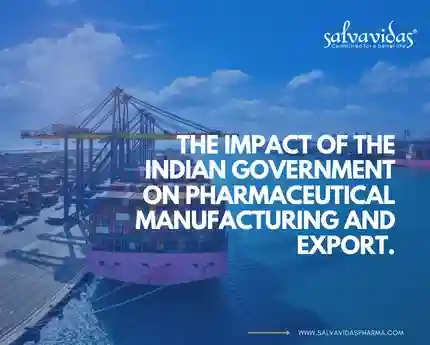
The Impact of the Indian Government on Pharmaceutical Manufacturing and Export.
The pharmaceutical industry is one of the fastest growing industries in India, with a large number of companies manufacturing and exporting a wide range of drugs and medicines globally. The Indian government plays a vital role in promoting the growth and development of this industry and has taken several measures to support and regulate it. In this article, we will explore the impact of the Indian government on pharmaceutical manufacturing and export in India.
Policies and Initiatives by the Indian Government to Support the Pharmaceutical Industry
The Indian government has implemented several policies and initiatives aimed at promoting the growth of the pharmaceutical industry in the country. Some of the key policies and initiatives are:
- Make in India campaign: The Make in India campaign was launched by the Indian government in 2014, with the objective of encouraging companies to manufacture products in India and creating employment opportunities in the country. The pharmaceutical industry has been one of the main beneficiaries of this initiative, with several foreign companies setting up their manufacturing facilities in India.
- FDI in Pharmaceuticals: The Indian government has allowed 100% foreign direct investment (FDI) in the pharmaceutical sector, which has led to increased investment in the industry and the setting up of new manufacturing facilities.
- Tax Incentives: The Indian government has provided tax incentives to companies that invest in the pharmaceutical industry, which has helped to attract investment and increase production.
- National Pharmaceutical Pricing Authority (NPPA): The NPPA is a regulatory body set up by the Indian government to regulate the prices of medicines in the country and ensure that they are affordable for the general public.
Challenges Faced by the Pharmaceutical Industry in India
Despite the support provided by the Indian government, the pharmaceutical industry in India faces several challenges, including:
Intellectual Property Rights (IPR) Issues: India is known for its generic drug industry, which has faced several challenges related to IPR. Many multinational pharmaceutical companies have raised concerns about the lack of protection for their patent rights in India.
Quality Control Issues: The Indian government has set up several regulations to ensure the quality of drugs manufactured in the country, but there have been instances of substandard drugs being manufactured and exported from India.
High Cost of Raw Materials: The high cost of raw materials used in the manufacture of drugs is a major challenge faced by the pharmaceutical industry in India. This has led to an increase in the cost of drugs and a decrease in profit margins for companies.
The Impact of the Indian Government on Pharmaceutical Manufacturing and Export
The impact of the Indian government on the pharmaceutical manufacturing and export industry in India has been positive, with several measures taken to support the growth and development of the industry. However, the challenges faced by the industry, such as IPR issues and quality control problems, need to be addressed by the government to ensure that the industry continues to grow and reach new heights.
Frequently Asked Questions
Q: What is the Make in India campaign?
A: The Make in India campaign is a government initiative launched in 2014 with the objective of encouraging companies to manufacture products in India and creating employment opportunities in the country.
Q: How has the Indian government supported the pharmaceutical industry?
A: The Indian government has implemented several policies and initiatives to support the pharmaceutical industry, including allowing 100% foreign direct investment (FDI), providing tax incentives, and setting up the National Pharmaceutical Pricing Authority (NPPA) to regulate drug prices.
Q: What are the challenges faced by the pharmaceutical industry in India?
A: The pharmaceutical industry in India faces challenges such as intellectual property rights (IPR) issues, quality control problems, and the high cost of raw materials.
Conclusion
The Indian government has played a crucial role in promoting the growth and development of the pharmaceutical industry in the country. The policies and initiatives implemented by the government have led to increased investment, higher production, and the creation of employment opportunities in the industry. However, there are still challenges that need to be addressed to ensure that the industry continues to grow and reach its full potential. The Indian government needs to continue its support and take measures to address the challenges faced by the pharmaceutical industry in India. The Impact of the Indian Government on Pharmaceutical Manufacturing and Export will continue to shape the future of the industry and determine its success in the years to come.
Contact Us:
Name: salvavidas pharmaceutical pvt. ltd
Email: info@salvavidaspharma.com
Phone No: +91 98983 21242
Address: Corp. Office #803, Shubh Square, Near Lal Darwaja, Surat, Gujarat 395004, India

0